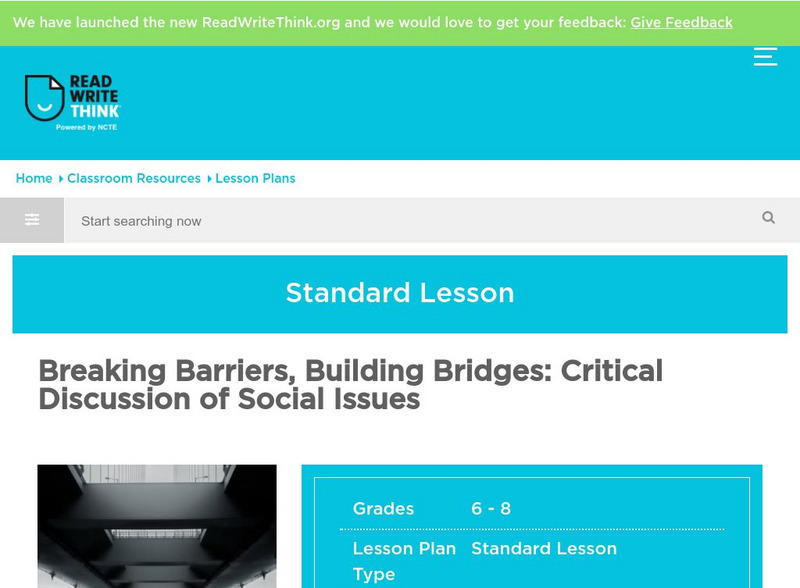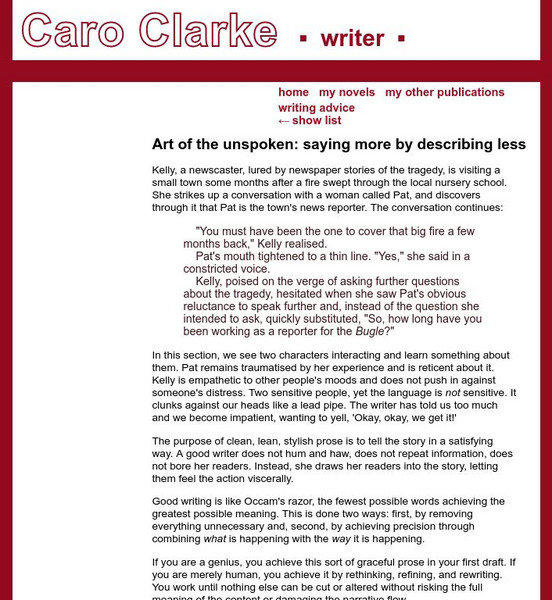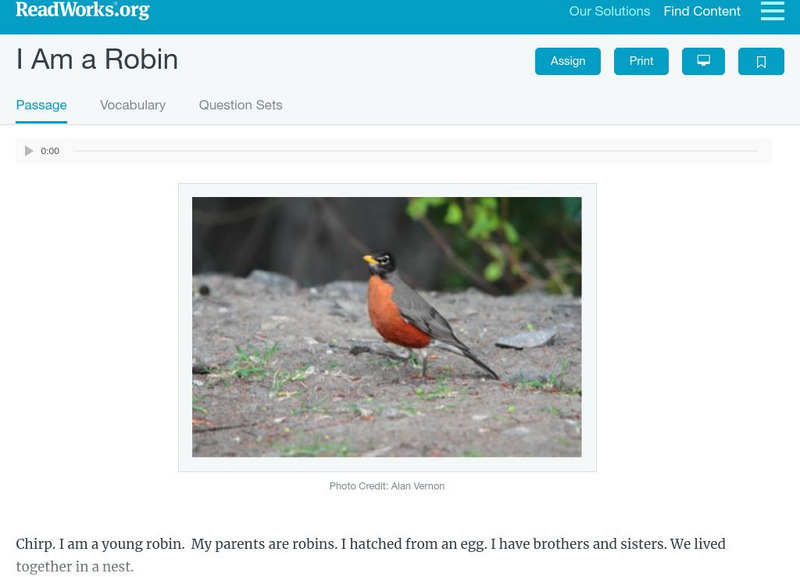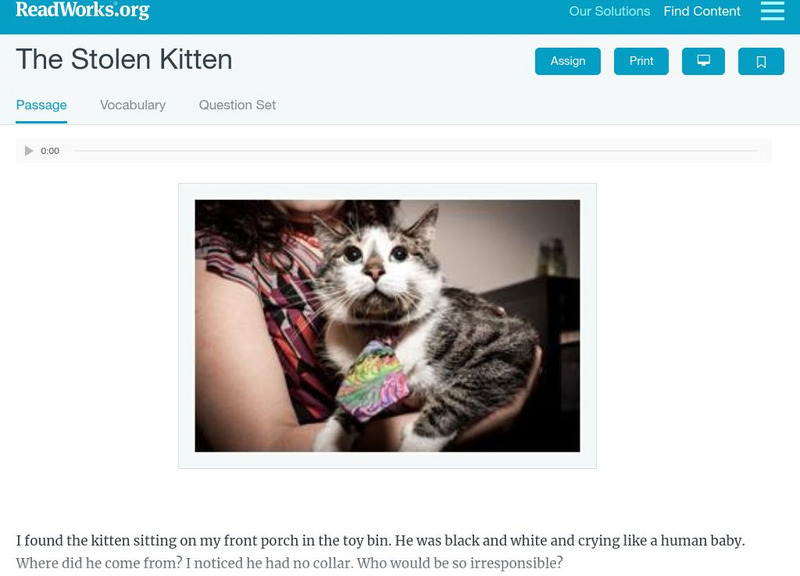National Endowment for the Humanities
Neh: Edsit Ement: Lesson 4: Faulkner's as I Lay Dying: Burying Addie's Voice
In this lesson plan, students will consider Lesson 4: Faulkner's As I Lay Dying: Burying Addie's Voice. Worksheets and other supporting materials can be found under the Resources tab.
Houghton Mifflin Harcourt
Holt, Rinehart and Winston: Elements of Literature: Narrator Chart [Pdf]
Provides an overview of the importance of a narrator in a text and some brief exercises for analysis. Helps students learn more about the role of the narrator in literature, his/her voice, and influence on other characters and events.
Writing Fix
Writing Fix: Mob's Voice vs. Hero's Voice
In this lesson, the novel To Kill a Mockingbird, written by Harper Lee, is used to get learners to explore point of view and issues related voice in writing and social justice. This lesson requires the students to analyze and discuss the...
ReadWriteThink
Read Write Think: Breaking Barriers: Critical Discussion of Social Issues
Through a series of picture book read-alouds and journal entries, learners engage in critical discussion of complex issues of race, class, and gender.
ReadWriteThink
Read Write Think: Teaching Point of View With Two Bad Ants
Contains plans for two lessons that teach point of view using the book "Two Bad Ants" by Chris Van Allsburg and titles from the from the "Look Once, Look Again" series by David M. Schwartz. In addition to objectives and standards, this...
ReadWriteThink
Read Write Think: Exploring Perspective in Narrative
Interactive lesson which allows students to determine the perspective or point of view of a story character by imagining actually spending a day in their "shoes." Based on Atticus's statement in "To Kill a Mockingbird." W.11-12.3, 3a,...
E Reading Worksheets
E Reading Worksheets: Tone Worksheets and Lessons
This learning module provides remediation and extra practice with identifying an author's tone. Reinforcement for understanding author's tone is provided through the five different worksheets and a mini-lesson. CCSS.ELA-Literacy.CCRA.R.4
E Reading Worksheets
E Reading Worksheets: Point of View Activities
This learning module provides assorted activities for teaching and reviewing the concept of point of view with students. The following activities are provided: point of view comic strip; point of view flash cards; point of view practice...
E Reading Worksheets
E Reading Worksheets: Point of View Worksheets
The learning module provides numerous drills via worksheet and video lesson links that cover different grade bands and text levels. Each exercise includes excerpts from famous works of literature and famous authors.
E Reading Worksheets
E Reading Worksheets: Reading Activities
An assortment of reading mini-projects are included on this site. Reading skills worksheets and differentiated reading activities are also included.
Grammarly
Grammarly Blog: Consistent Point of View
This Grammarly Handbook resource reminds students how to write with a consistent point of view. Examples are provided to demonstrate how to fix a sentence that contains an inconsistent point of view.
Caro Clarke
Not Stopping the Reader: How to Avoid Stumbling Blocks
This is the eighth article in a series that focuses on helping the new novel author. This article looks at how the author can avoid creating stumbling blocks that disrupt the flow of the novel.
Caro Clarke
Explaining Too Much: Why More Is Less
This is the eleventh article in a series that is designed to help the new novel author. This article focuses on how to eliminate needless information in your novel. The key is to not explain too much about the action.
Caro Clarke
The Art of the Unspoken: Saying More by Describing Less
This is the thirteenth article in a series that was developed to help the new novel author. This article focuses on how good descriptions aren't necessarily connected with a lot of words, good descriptions are clean and to the point.
Read Works
Read Works: I Am a Robin
[Free Registration/Login Required] A literary text with a robin telling the story of his parents have raised him. A question sheet is available to help students build skills in reading comprehension.
Read Works
Read Works: The Stolen Kitten
[Free Registration/Login Required] A literary text about a child who learns to do the right thing because there is often more to a story than you might realize at first. A question sheet is available to help students build skills in...
Read Works
Read Works: In the Night Passage & Question Set
[Free Registration/Login Required] This literary text passage shares a first person account of a cat and its night on the prowl. This passage reinforces essential reading comprehension skills. Opportunities for vocabulary acquisition are...
Read Works
Read Works: Portrait of an Artist
[Free Registration/Login Required] This nonfiction passage shares a first person account of an artist's life. This passage is intended for guided practice and is designed to reinforce essential reading comprehension skills.
Read Works
Read Works: Earth 2072
[Free Registration/Login Required] A literary text describing what school might be like in the future. A question sheet is available to help students build skills in reading comprehension.
Read Works
Read Works: A Small Life
[Free Registration/Login Required] This short story shares a fictional account from the perspective of a hamster. This passage is a stand-alone curricular piece that reinforces essential reading skills and strategies and establishes...
Read Works
Read Works: A Small Life
[Free Registration/Login Required] A literary text about the life of a hamster, from the hamster's point of view. A question sheet is available to help students build skills in reading comprehension.
Read Works
Read Works: Eyewitness to History: I'm American No Matter What
[Free Registration/Login Required] TThis passasge contains a first person account of a child who was rounded up and placed in a Japanese internment camp after the bombing of Pearl Harbor. This passage is a stand-alone curricular piece...
Sophia Learning
Sophia: One vs. You
This slideshow lesson focuses on the use of "one" and "you." It defines each, explains the differences, tells when to use each, and provides examples.
Read Works
Read Works: Point of View Unit
[Free Registration/Login Required] A series of three lesson plans designed to teach students first and third person point of view and the differences between them. Lessons are based on the books White Socks Only by Evelyn Coleman, Where...


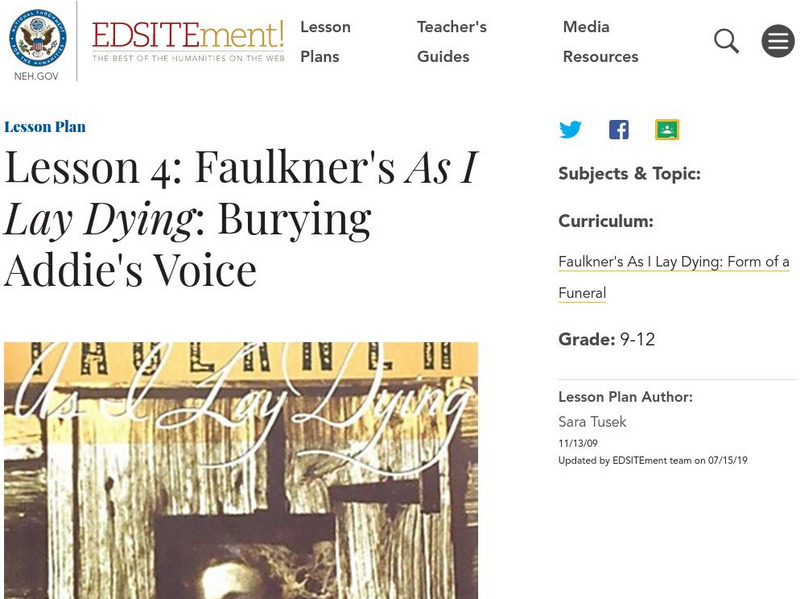
![Holt, Rinehart and Winston: Elements of Literature: Narrator Chart [Pdf] Graphic Holt, Rinehart and Winston: Elements of Literature: Narrator Chart [Pdf] Graphic](http://content.lessonplanet.com/resources/thumbnails/410058/large/bwluav9tywdpy2symdiwmduymc03nzcylxblamtwbi5qcgc.jpg?1589985144)

